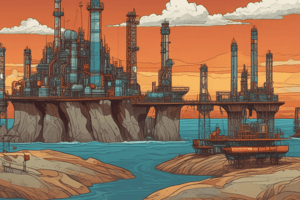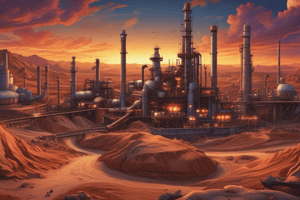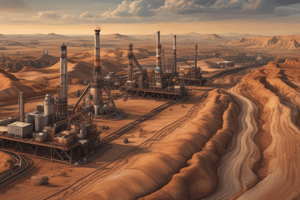Podcast
Questions and Answers
What is the primary process that leads to the formation of magma through the addition of water or carbon dioxide to rock?
What is the primary process that leads to the formation of magma through the addition of water or carbon dioxide to rock?
- Plutonism
- Volcanism
- Metamorphism
- Flux melting (correct)
At which geological setting does transfer of heat typically occur, leading to the melting of surrounding rock?
At which geological setting does transfer of heat typically occur, leading to the melting of surrounding rock?
- Hotspots
- Transform boundaries
- Divergent boundaries
- Convergent boundaries (correct)
What does plutonism refer to in geological terms?
What does plutonism refer to in geological terms?
- Change in rock composition due to weathering
- Formation of intrusive igneous rock (correct)
- Magma mixing with groundwater
- Eruption of magma onto the surface
What is volcanism associated with in geological processes?
What is volcanism associated with in geological processes?
How does metamorphism occur in rocks?
How does metamorphism occur in rocks?
Which statement best describes the role of James Hutton in geology?
Which statement best describes the role of James Hutton in geology?
What happens to rocks during the process of flux melting?
What happens to rocks during the process of flux melting?
Which of the following processes is NOT associated with the study of volcanism?
Which of the following processes is NOT associated with the study of volcanism?
What is the main effect of soil moisture on plant growth?
What is the main effect of soil moisture on plant growth?
Which component of soil is crucial for sustaining plant fertility?
Which component of soil is crucial for sustaining plant fertility?
How does soil texture influence its characteristics?
How does soil texture influence its characteristics?
What describes the soil texture triangle?
What describes the soil texture triangle?
Which gas is not typically found filling the open spaces in soil?
Which gas is not typically found filling the open spaces in soil?
What characteristic reflects the thickness of soil from the surface to a limiting layer?
What characteristic reflects the thickness of soil from the surface to a limiting layer?
Why is soil considered a semi non-renewable resource?
Why is soil considered a semi non-renewable resource?
What aspect of soil structure significantly influences porosity?
What aspect of soil structure significantly influences porosity?
What is the primary effect of soil erosion?
What is the primary effect of soil erosion?
Which condition is characterized by the extreme degradation of productive land?
Which condition is characterized by the extreme degradation of productive land?
What happens to soil during acidification?
What happens to soil during acidification?
What is salinization's primary effect on soil?
What is salinization's primary effect on soil?
What type of contamination can severely impact soil microorganisms and plants?
What type of contamination can severely impact soil microorganisms and plants?
Which process involves the accumulation of nitrogen and phosphorus leading to nutrient pollution?
Which process involves the accumulation of nitrogen and phosphorus leading to nutrient pollution?
Which of the following activities contributes to soil pollution?
Which of the following activities contributes to soil pollution?
What is a common result of deforestation on soil quality?
What is a common result of deforestation on soil quality?
What occurs at a divergent plate boundary?
What occurs at a divergent plate boundary?
Which of the following is NOT a type of convergent boundary?
Which of the following is NOT a type of convergent boundary?
What is the average rate of tectonic plate movement?
What is the average rate of tectonic plate movement?
Which type of plate boundary is characterized by plates sliding past each other?
Which type of plate boundary is characterized by plates sliding past each other?
Which of the following accurately describes an ocean-ocean convergent boundary?
Which of the following accurately describes an ocean-ocean convergent boundary?
The movement pushing older rock to both sides of a ridge is caused by which geological process?
The movement pushing older rock to both sides of a ridge is caused by which geological process?
Which of the following statements about the North Atlantic plate movement is correct?
Which of the following statements about the North Atlantic plate movement is correct?
What is the typical range of rates for tectonic plate movement in the Pacific region?
What is the typical range of rates for tectonic plate movement in the Pacific region?
What type of metamorphism occurs due to the proximity to igneous intrusions?
What type of metamorphism occurs due to the proximity to igneous intrusions?
Which type of metamorphism is primarily caused by mechanical deformation?
Which type of metamorphism is primarily caused by mechanical deformation?
What natural process is responsible for water moving from soil and living things into the atmosphere?
What natural process is responsible for water moving from soil and living things into the atmosphere?
Which of the following best describes the volume of groundwater compared to surface water?
Which of the following best describes the volume of groundwater compared to surface water?
Which type of metamorphism is associated with high temperatures and moderate pressures caused by hydrothermal fluids?
Which type of metamorphism is associated with high temperatures and moderate pressures caused by hydrothermal fluids?
What is a key characteristic of burial metamorphism?
What is a key characteristic of burial metamorphism?
Which component of the hydrologic cycle refers to water that has accumulated artificially or naturally?
Which component of the hydrologic cycle refers to water that has accumulated artificially or naturally?
Which of the following types of metamorphism occurs due to stresses from extraterrestrial impacts?
Which of the following types of metamorphism occurs due to stresses from extraterrestrial impacts?
What is one approach to encourage recycling in manufacturing?
What is one approach to encourage recycling in manufacturing?
How can the informal sector contribute to recycling efforts?
How can the informal sector contribute to recycling efforts?
Why is community effort important in managing plastic waste?
Why is community effort important in managing plastic waste?
What role should governments play in promoting recycling and waste management?
What role should governments play in promoting recycling and waste management?
What cultural shift is necessary for advancing towards a sustainable circular economy?
What cultural shift is necessary for advancing towards a sustainable circular economy?
What does the term 'tectonic' refer to?
What does the term 'tectonic' refer to?
What are the major effects of plate motion?
What are the major effects of plate motion?
Which of the following best describes the interaction of tectonic plates?
Which of the following best describes the interaction of tectonic plates?
Flashcards
Contact Metamorphism
Contact Metamorphism
Metamorphism caused by heat from nearby igneous intrusions.
Cataclastic Metamorphism
Cataclastic Metamorphism
Metamorphism due to rock movement and friction along faults.
Hydrothermal Metamorphism
Hydrothermal Metamorphism
Metamorphism caused by hot, watery fluids.
Regional Metamorphism
Regional Metamorphism
Signup and view all the flashcards
Burial Metamorphism
Burial Metamorphism
Signup and view all the flashcards
Shock/Impact Metamorphism
Shock/Impact Metamorphism
Signup and view all the flashcards
Precipitation
Precipitation
Signup and view all the flashcards
Groundwater
Groundwater
Signup and view all the flashcards
Flux Melting
Flux Melting
Signup and view all the flashcards
Flux Melting Cause
Flux Melting Cause
Signup and view all the flashcards
Plutonism
Plutonism
Signup and view all the flashcards
Volcanism
Volcanism
Signup and view all the flashcards
Metamorphism
Metamorphism
Signup and view all the flashcards
Magma Creation (Flux)
Magma Creation (Flux)
Signup and view all the flashcards
Convergent Boundaries
Convergent Boundaries
Signup and view all the flashcards
Heat Transfer (Melting)
Heat Transfer (Melting)
Signup and view all the flashcards
Desalination
Desalination
Signup and view all the flashcards
Soil Composition
Soil Composition
Signup and view all the flashcards
Soil Components
Soil Components
Signup and view all the flashcards
Soil Formation
Soil Formation
Signup and view all the flashcards
Soil Moisture
Soil Moisture
Signup and view all the flashcards
Soil Texture
Soil Texture
Signup and view all the flashcards
Humus
Humus
Signup and view all the flashcards
Soil Texture Triangle
Soil Texture Triangle
Signup and view all the flashcards
Soil Pollution
Soil Pollution
Signup and view all the flashcards
Soil Erosion
Soil Erosion
Signup and view all the flashcards
Desertification
Desertification
Signup and view all the flashcards
Soil Acidification
Soil Acidification
Signup and view all the flashcards
Soil Salinization
Soil Salinization
Signup and view all the flashcards
Heavy Metal Contamination
Heavy Metal Contamination
Signup and view all the flashcards
Eutrophication
Eutrophication
Signup and view all the flashcards
Human Impact on Soil
Human Impact on Soil
Signup and view all the flashcards
Recycling in manufacturing
Recycling in manufacturing
Signup and view all the flashcards
Partnership with informal sector
Partnership with informal sector
Signup and view all the flashcards
Community campaigns
Community campaigns
Signup and view all the flashcards
Policy and planning (Government Role)
Policy and planning (Government Role)
Signup and view all the flashcards
Throwaway culture
Throwaway culture
Signup and view all the flashcards
Sustainable circular economy
Sustainable circular economy
Signup and view all the flashcards
Plate tectonics
Plate tectonics
Signup and view all the flashcards
Tectonic features
Tectonic features
Signup and view all the flashcards
Seafloor Spreading
Seafloor Spreading
Signup and view all the flashcards
Ocean-Continent Convergent
Ocean-Continent Convergent
Signup and view all the flashcards
Ocean-Ocean Convergent
Ocean-Ocean Convergent
Signup and view all the flashcards
Continent-Continent Convergent
Continent-Continent Convergent
Signup and view all the flashcards
Lateral Plate Boundary
Lateral Plate Boundary
Signup and view all the flashcards
Plate Movement Speed
Plate Movement Speed
Signup and view all the flashcards
Study Notes
Energy Resources
- Energy is the ability to do work and comes in many forms.
- Non-renewable energy sources are those that will run out in our lifetime. Fossil fuels are an example.
- Fossil fuels are formed from fossilized remains of plants and animals, high in carbon content.
- Oil, also known as petroleum, is refined into usable fuels like gasoline, propane, and kerosene. Crude oil is a fossil fuel made of hydrocarbons.
- Natural gas is mostly methane and is used as a fuel for many materials and chemicals. It can be found in coal deposits.
- Nuclear energy generates electricity by splitting atoms; this is a non-renewable energy source.
Fossil Fuels
- Fossil fuels are formed from the fossilized remains of plants and animals.
- They are high in carbon content.
- Oil, also known as petroleum, is a fossil fuel mined and transported to refineries to produce usable fuels. Petroleum is a Greek word for rock and oil.
- Natural gas is primarily methane, used as a fuel.
- Coal is a solid fossil fuel made of carbon. Coal is also a sedimentary rock.
How Coal was Formed
- Coal formed millions of years ago from plants buried in swamps.
- Over time, pressure and heat turned the plant remains into coal.
- Different types of coal exist, ranging from lignite to anthracite, based on their carbon content and how they were formed.
Renewable/Alternative Energy
- Renewable energy comes from sustainable sources and does not involve burning fossil fuels or splitting atoms.
- Types include solar energy which uses the sun's rays for energy production, biofuels, hydroelectric energy using water flow, geothermal (Earth's heat) energy, and wind energy.
Environmental Concerns
- Fossil fuels cause air and water pollution, and CO2 emissions are harmful to the environment.
- Fossil fuels are slowly being replaced by renewable energy sources, and this depends on advancements in technology.
Geomorphic Processes
- Geomorphic processes are physical processes that create and modify landforms on the surface of the Earth.
- They can be categorized as endogenic or exogenic processes.
- Exogenic processes, for example, involve weathering, mass wasting, erosion, and transportation, which are responsible for the degradation of Earth's surface.
- Degradation processes create relief.
- Aggradation involves deposition processes.
- Weathering processes disintegrate rocks in situ. Examples of weathering processes include: physical or mechanical weathering, chemical weathering, and biologic weathering.
- Mass wasting is the downslope movement of rock, soil, and other debris due to gravity.
- Erosion involves wearing away of earth materials by natural forces.
- Transportation is the movement of eroded materials.
- Deposition is where eroded materials settle.
Water Resources
- Water is a vital resource.
- Water makes up most of the Earth's surface (71%).
- Water exists in different forms: surface water (oceans, lakes and rivers) and groundwater (in soil and rock).
- Groundwater is located within pore spaces of regolith and bedrock.
- Surface Water is present naturally or in formations where water can accumulate, called reservoirs.
- Water cycles (evaporation, precipitation, transpiration, infiltration, and runoff).
- Water is needed for many activities including agriculture, livestock, and everyday domestic use.
Waste Management
- Waste management deals with waste generated by human activities.
- Types of waste include municipal solid waste, industrial solid waste, agricultural waste, and hazardous waste.
- Waste can be disposed of in landfills, incinerated, or composted.
- Improper waste management can lead to serious problems such as contamination of water resources, clogging of drains and flooding, respiratory diseases from incineration, transmission of diseases and loss of biodiversity.
Thermal Desalination
- Thermal desalination is a process that uses heat to evaporate salt water, leaving behind fresh water.
Metamorphism
- Metamorphism is the alteration of the composition or structure of a rock due to heat, pressure, or other natural processes.
- This process changes existing rocks into new metamorphic rocks. Common types are contact, cataclastic, hydrothermal, regional, burial, and shock/impact metamorphism.
Soil Resources
- Soil is a mixture of mineral grains, organic matter, water, and air.
- Soil helps support plant growth.
- Soil texture describes the relative amounts of sand, silt, and clay. Soil depth is the thickness of the soil from the surface to a root-limiting layer.
- Soil profile is the vertical arrangement of soil layers or horizons.
- Soil quality refers to a soil's ability to sustain biological productivity, maintain environmental quality, and promote plant and animal health.
- Soil quality is affected by human activities such as farming, urbanization, and waste disposal.
Plate Tectonics
- The Earth's lithosphere is broken into several large plates that move slowly over the asthenosphere.
- Plates interact in various ways at their boundaries.
- Types of plate boundaries include convergent (where plates move toward each other), divergent (where plates move apart) and transform (where plates slide against each other horizontally).
- Sea-floor spreading occurs at divergent plate boundaries where new ocean floor is generated.
- Most scientists agree that the constant movement of tectonic plates affects the features of the Earth's surface.
Oceanic Drilling Samples
- Examination of samples from the ocean floor reveal insights about the age and composition of the seafloor (ocean crust).
Magma
- Magma is molten rock found beneath the Earth's surface.
- Magma can be created through various processes including decompression melting and flux melting.
Soil Horizons, Pollution and Quality
- Soil horizons are layers that form in the soil over time.
- Different components within the soil, like organic matter, are present at varying densities.
- Poor soil management can lead to problems like pollution and degradation of soil quality and vegetation.
- Acidification is another issue, occurring when acidic cations become concentrated in soil, for instance.
- Salinization is the accumulation of salt on the soil; it impacts physical quality and plant growth.
Studying That Suits You
Use AI to generate personalized quizzes and flashcards to suit your learning preferences.




